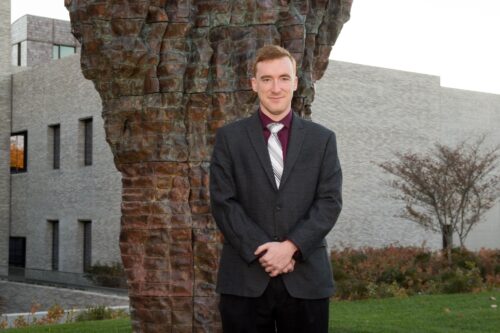By Molly A. Seltzer
Princeton University has signed a master agreement with the National Renewable Energy Laboratory, based in Golden, Colorado, allowing the easy exchange of researchers and students to accelerate the development of clean energy technologies. The U.S. Department of Energy national laboratory, known as NREL, has been the country’s flagship research center for sustainable energy since 1977 and has produced key breakthroughs in solar photovoltaics, biofuels, wind, and other clean energy areas.
 Under the agreement, NREL appointed Michael Mueller, associate professor of mechanical and aerospace engineering, as a faculty researcher. Mueller, an expert in computational science, turbulence, and combustion, began working with NREL’s Computational Science Center in summer 2020 and helped facilitate the creation of the new overarching agreement.
Under the agreement, NREL appointed Michael Mueller, associate professor of mechanical and aerospace engineering, as a faculty researcher. Mueller, an expert in computational science, turbulence, and combustion, began working with NREL’s Computational Science Center in summer 2020 and helped facilitate the creation of the new overarching agreement.
“The more interaction that we have between NREL and Princeton, the more rapidly we can develop technological solutions for clean energy,” said Mueller, who is an associated faculty member of the Andlinger Center for Energy and the Environment. “In my case, we have already conceptualized some very interesting new ideas in machine learning-based modeling of complex turbulent flows that are now being pursued at the national laboratory.”
Mueller said the group at NREL has cutting-edge expertise in applying computational science to problems beyond combustion in which Mueller already is a recognized expert. He said the exchange provides a great opportunity for him to acquire new skills and to more rapidly identify areas where his Princeton research group has niche expertise in combustion that can be applied to the broader energy research community. The common challenge of predicting the behavior of complex multi-physics turbulent flows is shared by, not only combustion energy conversion, but also wind energy, bioenergy, and other energy systems.
“These ideas we’ve brainstormed together will undoubtedly lead to new projects and new opportunities in the coming years in the application of computational science to complex multi-physics turbulent flows across a wide range of energy systems. I have no doubt that opportunities for collaboration and new discoveries will come about at a faster pace because our partnership is formalized and conversations are happening more often,” said Mueller.
Ray Grout, director of NREL’s Computational Science Center, said the joint appointment will allow NREL’s experts in computational science and combustion to “work closely with another leading combustion scientist, Michael E. Mueller, to enhance research collaboration, while offering unique educational opportunities to Princeton students and the research community.”
The master agreement is designed to accelerate collaboration between anyone at the University with colleagues at NREL by streamlining the appointment process and standardizing terms related to intellectual property.
“Establishing a partnership with NREL is a fantastic way to strengthen the existing research collaborations between our scientific communities,” said Z. Jason Ren, acting director and associate director for research at Princeton University’s Andlinger Center for Energy and the Environment, and a professor of civil and environmental engineering and the Andlinger Center.
Ren himself has been a visiting professor with NREL since 2015 when he was a professor at CU-Boulder. NREL has strong relationships with many universities in Colorado. The agreement with Princeton is part of NREL’s recently launched University Partnerships Program, which aims to build and strengthen strategic research collaborations across the U.S and internationally.
“At the Andlinger Center for Energy and the Environment, we see vast opportunity for sharing expertise and deepening cooperation to advance renewable energy research and train the next generation of scholars, and this agreement makes it all the easier to tap into resources at the national laboratory,” said Ren.